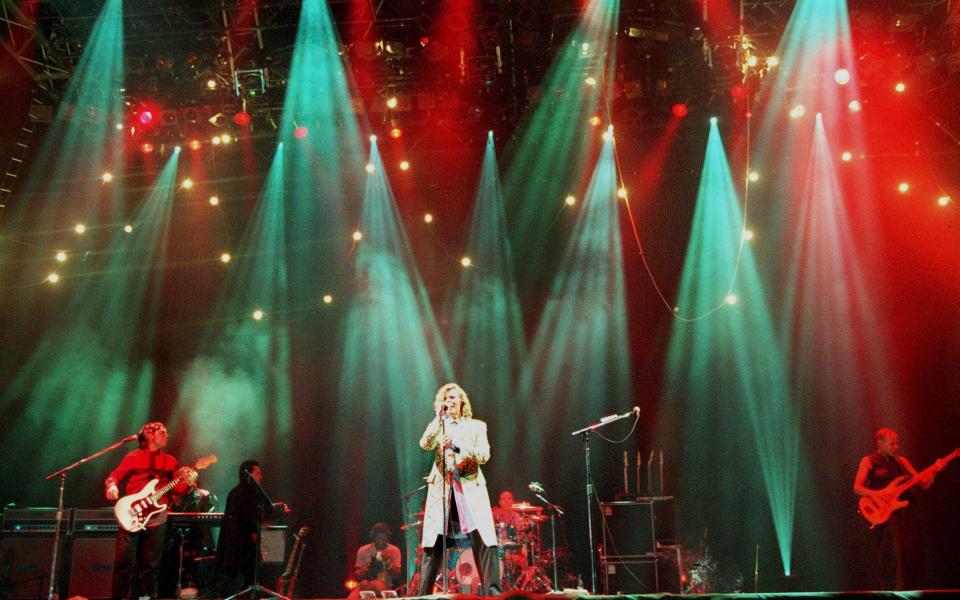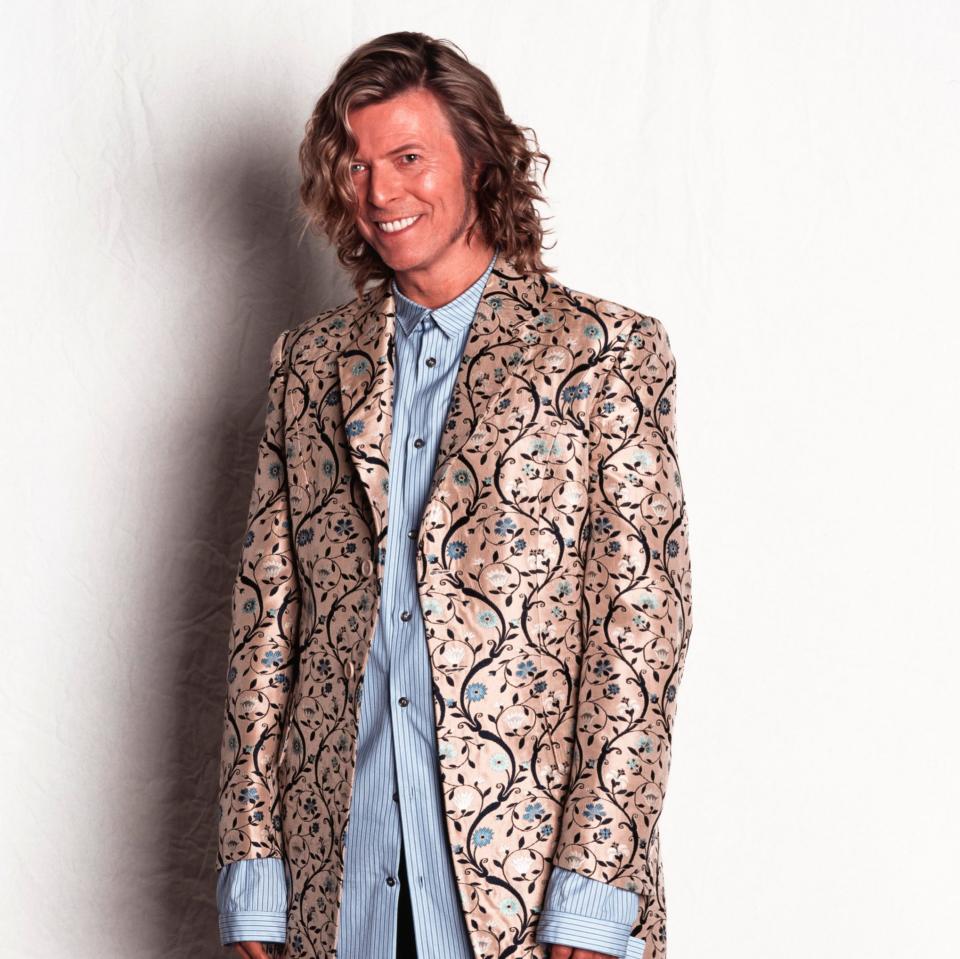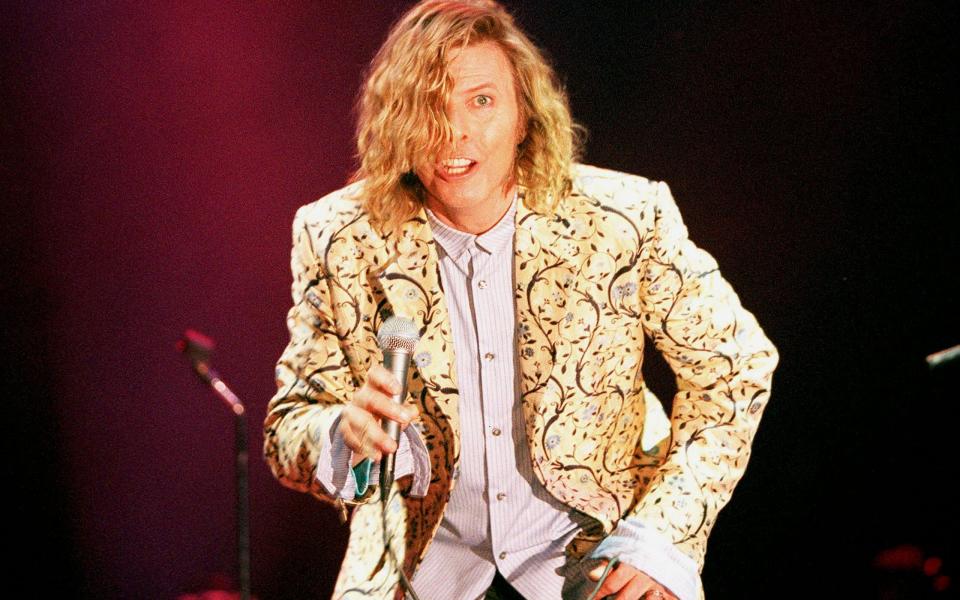'You naughty boys': how David Bowie was tricked into playing Glastonbury 2000

In May 2000 David Bowie was sitting in his New York apartment wondering what he’d done. “I find my present situation more than a little confusing actually as I really don’t remember why I agreed to close this year’s Glastonbury Festival in the first place,” he wrote in his diary.
“It couldn’t be more inconvenient in a way, now knowing that our pregnancy is well and truly for real. It means losing a clutch of days away from home. Days that I get more and more precious over.”
Bowie, then 53, and his wife Iman had announced two months earlier that they were expecting their first child together that August. The news had seen the singer put plans for future live shows on hold — apart, that is, from June’s Glastonbury. But domestic matters were only one reason behind Bowie’s uneasiness.
The famously anti-nostalgic singer had assiduously avoided playing greatest hits concerts since his Sound+Vision Tour a decade earlier, favouring more experimental music instead. But Glastonbury’s high profile made it different. As well as 100,000 ticketholders, millions would watch live on the BBC. Bowie’s reluctant acceptance in his diary that “big, well-known songs shall litter the field this year at Glastonbury” suggested that he knew how much was riding on that Sunday night show.
But what Bowie can’t have foreseen is just how vindicated he would be, both in playing the festival and dusting down the hits. In front of a crowd swollen to 250,000 by fence-jumpers, he played 21 classics from the Pyramid Stage like a soul awoken. Rather than reject this past, Bowie embraced it. From Absolute Beginners and Starman to Heroes and Let’s Dance, he gave a career retrospective to a heaving mass of humanity.
In a nod to his only previous Glastonbury appearance in the Hunky Dory era of 1971, Bowie wore Oxford bags, an Alexander McQueen brocade frock coat and long wavy hair, grown especially. Pop’s great chameleon had dressed as himself. “Oh Glastonbury, you’ve got a very lucky face,” he said from the stage, sensing that something special was afoot.
I was there, and expectations were middling. But it was one of those fabled Glastonbury nights of balmy communal joy, a night when neither audience nor performer can quite believe what they’re witnessing. A strange alchemy crackled over the Vale of Avalon that night. Over the 18 Glastonburys I’ve attended, it has never been bettered.
“You could feel it,” Bowie’s keyboard player Mike Garson tells me. Of the 1,000-plus shows Garson did with the singer before his death in 2016 — including the infamous 1973 Hammersmith Apollo show where Bowie killed off Ziggy Stardust — he puts Glastonbury in the top five. “You can’t put into words that feeling of electricity you get. The word is ineffable,” says Garson.
After a clutch of 1990s albums that dabbled in drum ‘n’ bass and industrial rock, the show reminded people who Bowie was, says his long-term PR man Alan Edwards. “We’d all forgotten who David Bowie was. With Glastonbury, he introduced a new generation to his music and simultaneously reminded an older generation about it,” says Edwards.

But if the show rejuvenated Bowie, it nearly finished Glastonbury. The dangerous level of fence jumping saw the festival take a break in 2001 (five days after Bowie’s appearance in Somerset, nine people were crushed to death at the Roskilde Festival in Denmark, making every festival rethink crowd safety).
When Glastonbury returned in 2002 it was ringed by an impenetrable £1 million super-fence. A new, safer Glastonbury had been born. Unbeknownst to everyone, Bowie’s appearance marked the end of an era.
In time-honoured rock and roll tradition, the show was never meant to happen. Bowie only played the festival due to a piece of cheeky PR skulduggery, his advisors claim. Glastonbury founder Michael Eavis had attended Bowie’s show at London’s now defunct Astoria on 2 December 1999 in support of the singer’s ‘hours…’ album.
According to Edwards, Eavis left the drum ‘n’ bass-heavy show early. Although Bowie’s live agent John Giddings was in tentative discussions about the singer doing Glastonbury, “there was no palpable interest from Michael’s end,” Edwards recalls. Two days later, Edwards and Giddings were in Manchester for the opening night of the Spice Girls’ Christmas in Spiceworld tour.
When a national newspaper journalist asked the men if they had any gossip, they whispered that Glastonbury were begging Bowie to play. The nugget, firmed up to state that Bowie had been “lined up” to headline, made the front pages. The positive reaction from fans and journalists alike saw the festival’s phones ring “off the hook”, says Edwards. But the move had been risky: he feared he’d overstepped the mark and, crucially, he hadn’t run his tactics past his boss.

“I didn’t hear from David,” says Edwards, who wondered if he’d survive as his PR. He nervously watched his inbox. Three days later an email arrived from the singer. “I gingerly opened it. It started ‘You naughty boys…’.” Weeks later, Bowie was confirmed as headliner.
Rehearsals began in New York on 1 June. Bowie re-assembled the core of the band who’d played on his ‘hours…’ tour but with one crucial addition. Guitarist Earl Slick, who’d played on Bowie’s mid-1970s albums Young Americans and Station to Station, hadn’t toured with the singer since 1983’s Serious Moonlight Tour.
Bowie assumed he’d been “swallowed up by the hills” but stumbled across Slick’s website in early 2000 and asked him back for Glastonbury. “Oh my, when he started playing at that first day’s rehearsal it was clear that he is still all fire,” Bowie wrote. Long jams gradually became “a serious attempt to come to grips with so much material.”
Now revved up, Bowie planned a long Glastonbury set stretching into the small hours of the morning (his contract only stipulated that he play a minimum of 90 minutes). However, a week into rehearsals his UK-based production manager gave him the “crap” news that if he broke the festival’s pre-midnight curfew, Eavis would be fined £20,000 a minute. Bowie faced the “hopeless task” of having to ditch 12 songs.

After warm-up shows at New York’s Roseland Ballroom, the band travelled to England. There, Bowie reminisced to his team about his 1971 appearance. He’d stayed in Worthy Farm itself, drinking and smoking with singers Terry Reid and Linda Lewis before his 5.30am show. He’d worn a Three Musketeers hat and a cape, and taken cannabis tincture. It was “a delightfully light and silly couple of days, all Tolkieny and mushrooms and ‘Oranges’,” Bowie wrote.
The BBC’s coverage that Sunday night in 2000 was a curious hotchpotch. Before Bowie’s show, the channel played a bizarre knockabout left-versus-right film in which socialist troubadour Billy Bragg showed the then Spectator editor Boris Johnson around the festival site.
In the film, the future Prime Minister misses Castle Cary train station due to being in “deep meditation” about a Telegraph leader column from his First Class carriage. Wearing a linen blazer throughout, Johnson pronounces the shindig “Glaaastonbury”, gets a henna tattoo (‘Respect’ in Sanskrit), quotes the Iliad and visits the site’s Stone Circle, where he praises the capitalist spirit of a magic mushroom seller. It is not known whether the Thick White Mane stayed to watch the Thin White Duke).

Showtime arrived. From the wings Bowie displayed his nerves by asking his keyboard player Garson to do something he was only ever asked three times (including at 1973’s Hammersmith show).
“He made me the guinea pig,” Garson explains. “He looked out to the audience and he got a little scared. He said ‘Mike, go and warm up the audience with Greensleeves.’ I said ‘Solo piano with a quarter of a million people looking at me? Are you out of your mind?’ He wanted to get a vibe. So I went out and did it.”
It was lucky Garson did as his keyboard wouldn’t work. “The volume was off. Fifty tech guys were running around like headless chickens looking for the problem. I’m getting nervous as the audience look like they’re going to kill me,” he says. Viewers can sense the hitch in the concert footage — to be aired in full for the first time on the BBC this month — when Garson’s Greensleeves is preceded by an unnaturally long spell of darkness on stage.
Sound issues sorted, the drama continued offstage. Bowie had insisted that the BBC only film a few songs live. But as the set progressed, head BBC producer Mark Cooper realised the performance was a classic in the making. To cut short the live transmission would be a “broadcasting disaster”, he has said.
Edwards recalls Cooper “pleading” with him at the side of the Pyramid to let the transmission continue. The PR guru briefly considered dashing on stage and asking Bowie to reconsider. “But I had my instructions… Ultimately the BBC had to come off Bowie,” Edwards says. Coverage was cut and embarrassed presenter Jamie Theakston introduced a pre-recorded film showing Michael Eavis singing Elvis.
It’s hard to know what precisely made the show so good. It could have been Bowie’s re-energised band, so fluid that the lack of stage set or pyrotechnics didn’t matter. It could have been the slow-building setlist, which riskily opened with ballad Wild Is The Wind and gently built. It could have been the crowd, exhausted by five days of partying but up for one more hooley. A sense of relief spread among us as we realised which David Bowie had turned up. By fifth song Life On Mars? relief had morphed into elation.
By the 19th song Heroes, elation became emotion. It could have been Bowie’s revelation that he’d just had laryngitis, or his audacious stagewear (although interestingly he ditched the frock coat as soon as the BBC cut its live footage and the photographers left the pit). But I think what really made this show unforgettable was simply him.
In realising that to look back was not to compromise, Bowie played with the assured gleam of a seasoned warrior finally able to lower his shield.
It was the little things: the way he beckoned the crowd in as he sang the “As long as we’re together” line in Absolute Beginners; the way he jumped with the moshing crowd during Changes (“Ch-ch-ch-aiiiiiiin-ges”), a song he’d debuted at Glastonbury 29 years earlier; his inter-song anecdotes that gave context and — often — comedy; his toothy smile throughout. “I haven’t been here for 30 years and this is f______ brilliant,” he beamed at one point. At the end he fell to his knees and worshipped the crowd.
Bowie was in an “extraordinary” almost trance-like state when he came off stage, Edwards says. “He must have known that this was one of the biggest moments of his career. And quite unexpected.”
It was in many ways a quiet triumph. Chart stats show that there was no album sales bounce after Bowie’s performance. And as planned due to the arrival of daughter Lexi that August, he didn’t tour again for two years. But what Bowie did that night was reclaim his crown. “We all — even us, who worked with him — welcomed him back,” Edwards says.
As it turned out, the set was arguably Bowie’s last ever great show. He quit touring in 2004 after emergency heart surgery in Germany during his A Reality Tour. For those of us there, Glastonbury was unforgettable. Afterwards we danced until sunrise, warmed by the Bowie afterglow and desperate to stave off the beckoning real world.
“There are two kinds of show,” concludes Garson. “There are the shows that I would call ‘professional’: the notes are right but nothing is happening that changes people’s souls. And then there are the magic shows where the musician becomes the magician. Hundreds of factors come together and all of a sudden the show is bigger than you. It’s like the notes find you and flow through you.
“That is what you got to see that night.”
David Bowie at Glastonbury 2000 will be shown on June 28 at 9.30pm, on BBC Two

